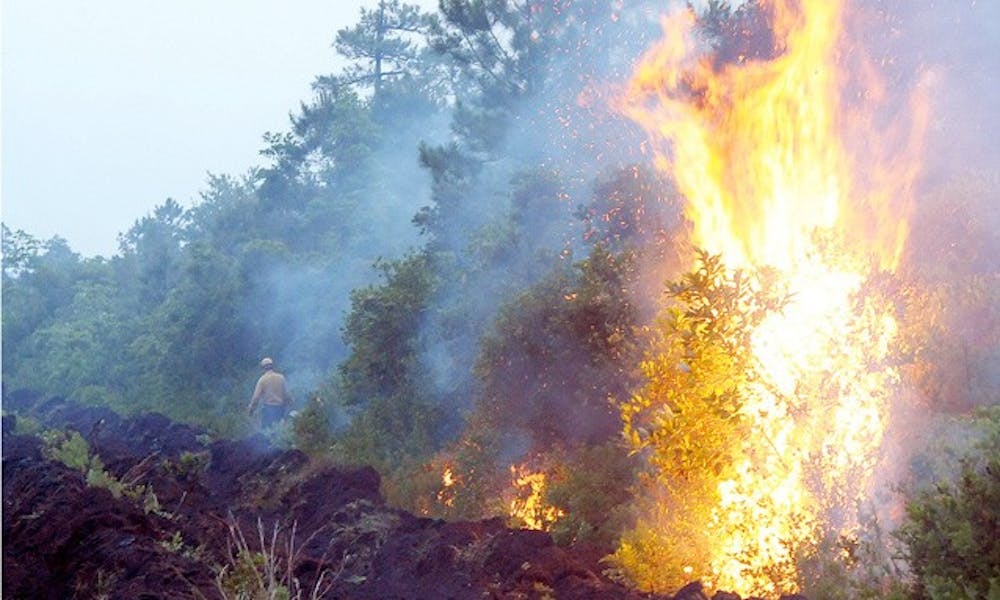So much for easy breathing.
Durham residents found themselves walking in hazy, smog-like conditions early this week after southeasterly winds caused smoke from wildfires in eastern North Carolina to drift into the Triangle area. As of last night, the wildfire in Pender County had raged across more than 18,000 acres while another fire blazed through 1,300 acres in Bladen County.
“The main problem we had [Tuesday] was the surface wind right at the ground level coming from the southeast,” said Phil Badgett, a meteorologist at the National Weather Service in Raleigh. “It was the perfect trajectory for the smoke to come from Pender County to our area—almost directly up the I-40. The wind flow was just perfect, or I guess you could say the worst case scenario.”
Officials from the North Carolina Division of Air Quality and the National Weather Service issued a Code Red alert late Tuesday morning and a Code Orange alert Wednesday. According to the state Division of Air Quality’s scale, the Code Red warning means that the concentration of particulates in the air is at a dangerously high level, posing potential health risks for anyone breathing in the air, while Code Orange implies that only certain groups of people are subject to risk.
Badgett noted that the smoke particulates and their effects were worse in Raleigh than in Durham, though added that this is the first air quality Code Red to be issued in nearly two years.
Particle pollution can have detrimental effects on people who spend a significant amount of time outdoors, especially those working or exercising, said Tom Mather, a spokesperson for the state Division of Air Quality. The concern, Mather added, is that the particulates are inhaled and then absorbed into a person’s bloodstream, potentially causing a sore or scratchy throat, watery eyes and coughing. Those with asthma or another respiratory condition are at a heightened risk for asthma attacks or shortness of breath. Elevated particulate levels have also been proven to pose a hazard for people with heart problems.
Mather said the smoke from the wildfires coming down into the Triangle greatly exceeded a normal particulate count. Durham’s air quality measured at 111 micrograms per cubic meter Tuesday. According to the Division of Air Quality’s website, the standard is 35 micrograms per cubic meter.
The Occupational and Environmental Safety Office issued an alert to various departments at Duke, such as Facilities and Maintenance, who often work outside, said OESO Director Wayne Thomann.
“The individual departments manage it, and they have the responsibility of accommodating employees,” Thomann said.
He added that he had not received specific concerns from managers about the conditions Tuesday.
The wildfire in the Holly Shelter Game Land area in Pender began Saturday with a strike of lightning, which set fire to the dried-out swamp area, said Reid Hawkins, a meteorologist at the National Weather Service in Wilmington. The Wilmington branch was the first to issue forecasts on the wildfires.
Hawkins added that forest conditions have been particularly dry this summer due to a shortage in rainfall. The region has only seen 55 percent of otherwise expected rainfall during the past six months and has received approximately a half-inch of rain in the last month.
North Carolina does have a history of wildfires, most notably a large fire in the 1980s, which also occurred in the Pender area, Hawkins said.
He added that the wildfires in Pender and Bladen County are still burning, and the weather service is hoping for rain.
“I don’t know when they’ll get them down, but we’re going to need some significant rain, or they’re going to have to break them down some other way,” he said. “There’s somewhat of a chance of rain on Thursday into Friday, but doesn’t look like it may be significant enough to break them down.”
Get The Chronicle straight to your inbox
Signup for our weekly newsletter. Cancel at any time.

